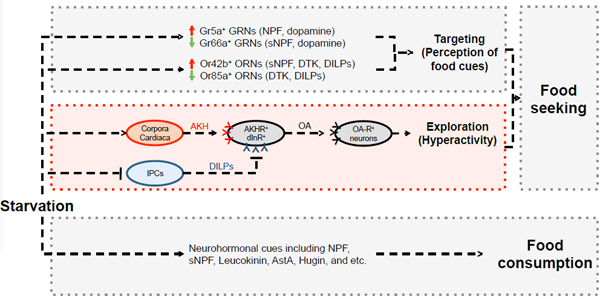Dr. LimingWang’s group published a research article on eLife online on September9th, 2016 with the title “Regulation of starvation-induced hyperactivity by insulin and glucagon signaling in adult Drosophila”.
Starvation induces sustained increase in locomotion, which facilitates food localization and acquisition and hence composes an important aspect of food-seeking behavior. We investigated how nutritional states modulated starvation-induced hyperactivity in adult Drosophila. The receptor of adipokinetic hormone (AKHR), the insect analog of glucagon, was required for starvation-induced hyperactivity. AKHR was expressed in a small group of octopaminergic neurons in the brain. Silencing AKHR+ neurons and blocking octopamine signaling in these neurons eliminated starvation-induced hyperactivity, whereas activation of these neurons accelerated the onset of hyperactivity upon starvation. Neither AKHR nor AKHR+ neurons were involved in increased food consumption upon starvation, suggesting that starvation-induced hyperactivity and food consumption are independently regulated. Single cell analysis of AKHR+ neurons identified the co-expression of Drosophila insulin-like receptor (dInR), which imposed suppressive effect on starvation-induced hyperactivity. Therefore, insulin and glucagon signaling exert opposite effects on starvation-induced hyperactivity via a common neural target in Drosophila.
These findingselucidates the mechanism how starvation induces food seeking behavior in adult Drosophila and separates it from food consumption behavior on hormone level. This research nicely links hunger and satiety hormone modulation on AKHR+ neurons to octopaminerelease, mapping out the neural logic for how they work in vivo, giving insight on the neural modulation of food seeking behavior in mammals.
PhD candidate Yue Yu and post-doc Rui Huang from Dr. Wang’s lab are the co-first authors. Undergraduate student Jie Ye from Dr. Wang’ lab, technician Chao Wu and PhD candidate Guo Cheng from Dr. JunlingJia’ lab also made contribution. Professor Liming Wang and Dr. Rui Huang are the corresponding author and co-corresponding author of this study, respectively.This study was funded by the Thousand Young Talents Plan, the NationalNatural Science Foundation of China, and the Fundamental Research Funds for the Central Universities.

Independent neural modulation of food seeking and food consumption in Drosophila



